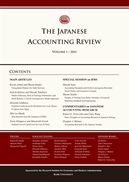1 巻, 2011 号
選択された号の論文の9件中1~9を表示しています
- |<
- <
- 1
- >
- >|
MAIN ARTICLES
-
2011 年1 巻2011 号 p. 1-16
発行日: 2011/12/31
公開日: 2013/03/15
PDF形式でダウンロード (471K) -
2011 年1 巻2011 号 p. 17-37
発行日: 2011/12/31
公開日: 2013/01/31
PDF形式でダウンロード (541K) -
2011 年1 巻2011 号 p. 39-60
発行日: 2011/12/31
公開日: 2013/03/15
PDF形式でダウンロード (487K) -
2011 年1 巻2011 号 p. 61-69
発行日: 2011/12/31
公開日: 2013/03/15
PDF形式でダウンロード (365K) -
2011 年1 巻2011 号 p. 71-104
発行日: 2011/12/31
公開日: 2013/03/15
PDF形式でダウンロード (683K)
SPECIAL SESSION on IFRS
-
2011 年1 巻2011 号 p. 105-117
発行日: 2011/12/31
公開日: 2013/03/15
PDF形式でダウンロード (293K) -
2011 年1 巻2011 号 p. 119-130
発行日: 2011/12/31
公開日: 2013/03/15
PDF形式でダウンロード (271K)
COMMENTARIES on JAPANESE ACCOUNTING RESEARCH
-
2011 年1 巻2011 号 p. 131-133
発行日: 2011/12/31
公開日: 2013/03/15
PDF形式でダウンロード (212K) -
2011 年1 巻2011 号 p. 135-140
発行日: 2011/12/31
公開日: 2013/03/15
PDF形式でダウンロード (236K)
- |<
- <
- 1
- >
- >|
